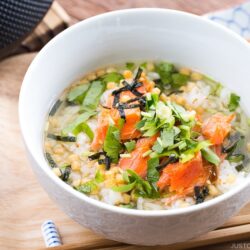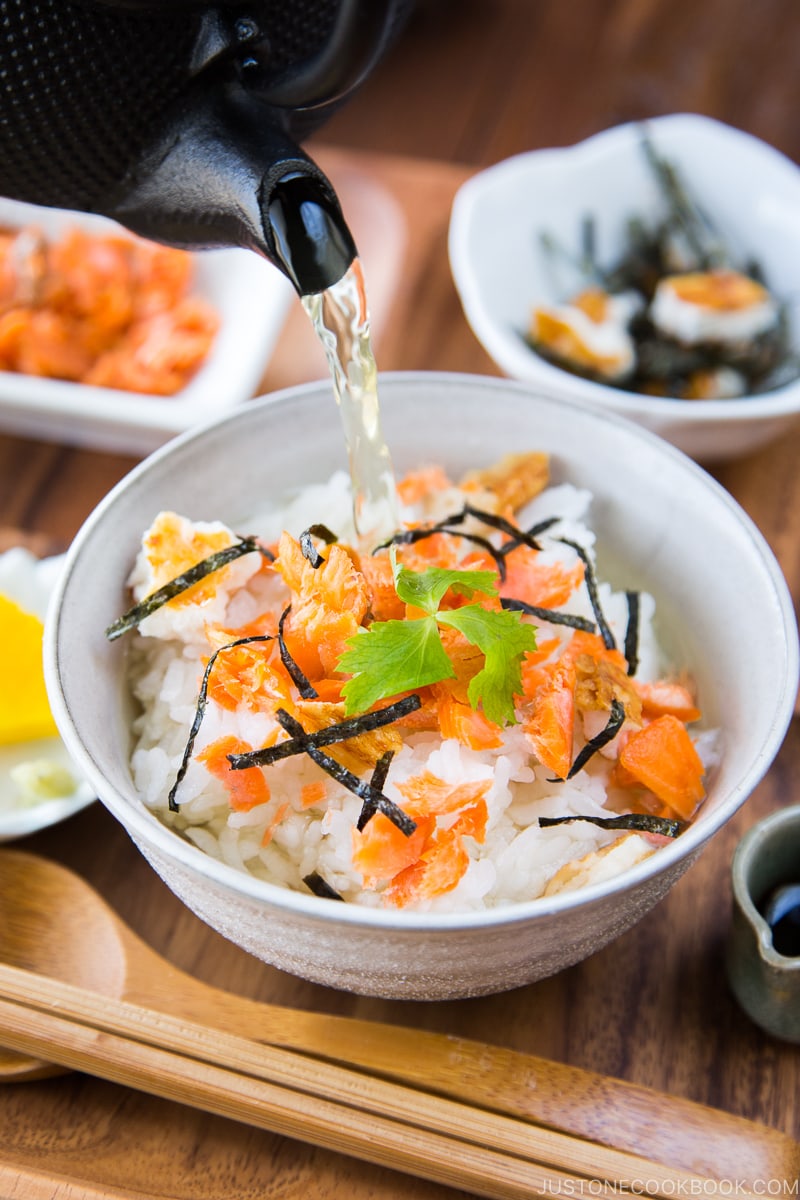
Ochazuke (お茶漬け) is the kind of comfort food that I crave. When I suffered from jet lag after a long plane ride from Japan, I would always make this rice dish to satisfy my midnight hunger pangs. The warm tea and rice were well received by my exhausted body and tasting it immediately comforted my homesickness when I was younger.
In today’s Ochazuke recipe, I’ll teach you the core ingredients that you’ll need to prepare this dish. I’ll also give you suggestions for toppings that you can customize your own bowl of comforting green tea over rice.
What is Ochazuke?
Ocha refers to green tea, and zuke means “submerged.” Ochazuke is a simple one-bowl dish featuring steamed rice with an assortment of savory ingredients, partially steeped in green tea or dashi (Japanese soup stock). Instead of proper mealtime food, the Japanese enjoy this dish more as a quick meal or to fill up at the end of the meal.
Soothing to eat and easy on the stomach, we often eat ochazuke when we feel under the weather or perhaps when there are no other ingredients to cook with. It’s the easiest meal to put together! All the ingredients are the usual staples from a Japanese pantry.
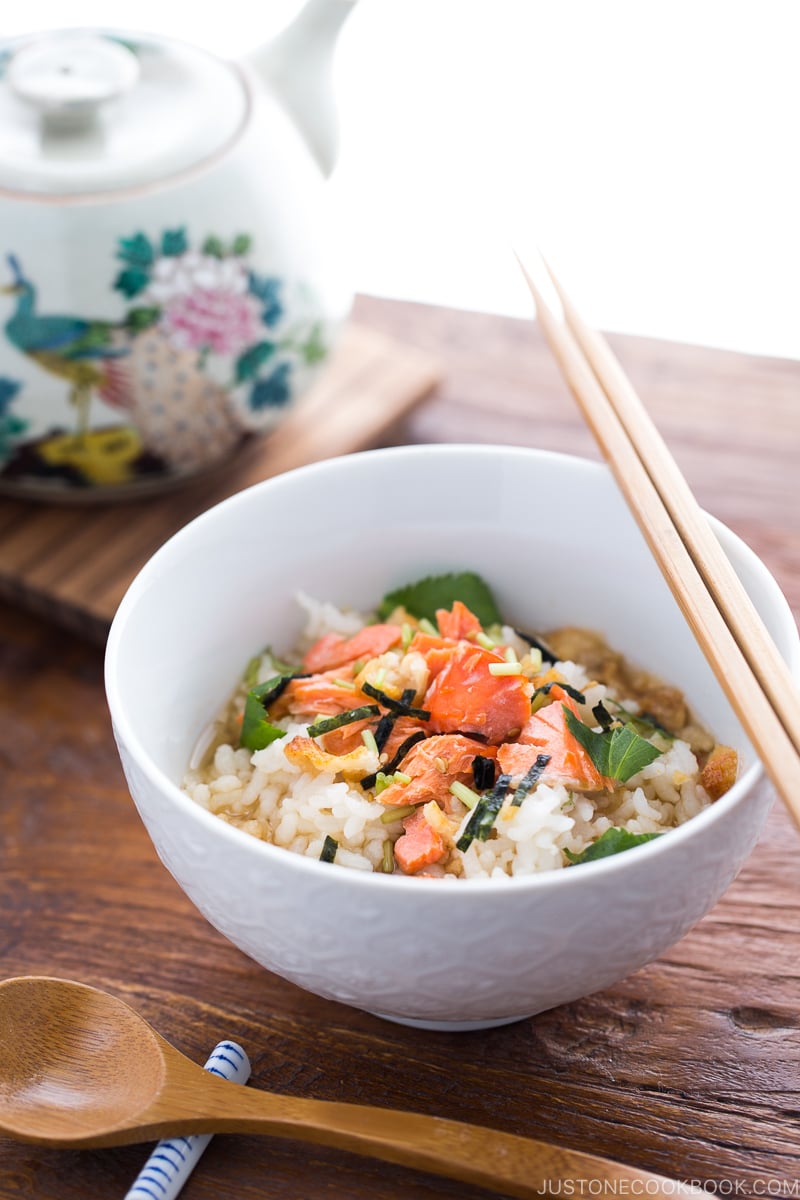
In Japanese manga and drama, you’ll find scenes of a Japanese student scarfing down a bowl of ochazuke while burning the midnight oil, or a tired salaryman who returns home from work and needs something quick to eat before hitting the sheets.
Ochazuke is a perfect quick meal to ease your hunger because it’s light and can be quickly prepared. It also has the magic to make you feel all warm and fuzzy inside after eating it.
Ingredients You’ll Need
- cooked Japanese short-grain rice
- Japanese Salted Salmon (shiozake) – you could use a regular salmon fillet and a pinch of salt, or use any leftover cooked salmon
- bubu arare (crispy puffed rice pellets) – or substitute crushed Japanese rice crackers
- shredded nori seaweed (kizami nori)
- toasted white sesame seeds
- mitsuba (Japanese parsley) – or use scallion/green onion
- wasabi – optional, to taste
For Ochazuke with Green Tea:
- Japanese green tea leaves – genmaicha, sencha, or hojicha; or use non-caffeinated mugicha (barley tea) for cold ochazuke
- hot water – to brew the tea
- soy sauce – optional
For Ochazuke with Dashi Broth:
- dashi (Japanese soup stock) – you can use standard Awase Dashi, dashi packet or powder, or Vegan Dashi
- mirin
- soy sauce
- kosher salt
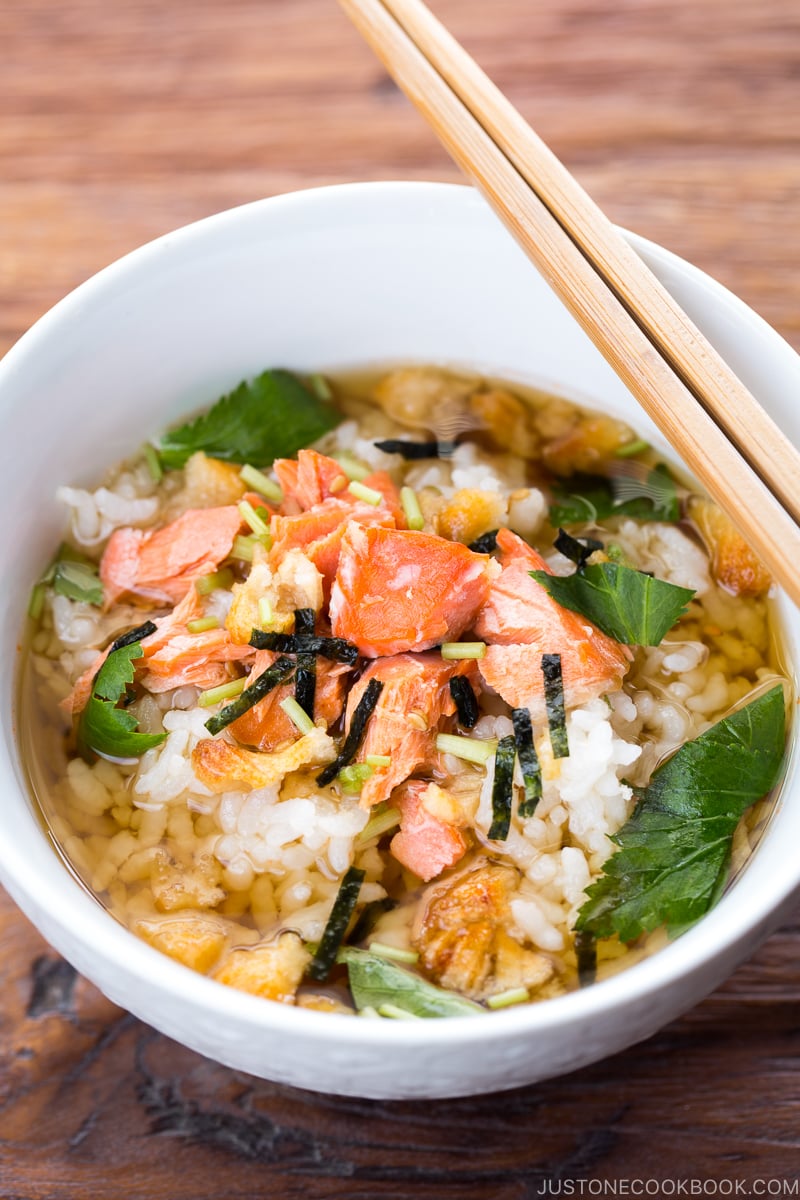
How to Make Ochazuke
- Bake the salted salmon and break it up into flakes.
- Prepare the green tea or dashi broth.
- Add the cooked rice to an individual bowl. Top with the flaked salmon, arare, nori, and sesame seeds.
- Pour the green tea or dashi broth about halfway up the bowl. Top with mitsuba and wasabi. Add soy sauce (optional, for the green tea version).
Types of Tea & Broth for Ochazuke
You can use various kinds of green tea such as genmaicha, sencha, and hojicha to make ochazuke. However, when you order ochazuke in Japanese restaurants, it is typically made with dashi broth instead of green tea.
The ochazuke served with green tea tends to be bland and relies on salty toppings to add more flavor. But with good dashi, the dish can be very flavorful even with just a few simple toppings.
For ochazuke in the summertime, you can also make it with cold rice and cold dashi or tea. I love using cold and caffeine-free mugicha (barley tea) to enjoy this cool and refreshing variation.
Suggestions for Ochazuke Toppings

I know some of the ingredients are quite hard to get outside of Japan, so feel free to change it up. You can keep it simple by using leftover rice and whatever you have from the fridge! Here are the ingredients commonly used to make green tea over rice:
- bubu arare (tiny rice cracker balls) – Amazon sells it
- Japanese pickles like umeboshi (salted pickled plum)
- nori seaweed
- pollock/cod roe (tarako & mentaiko)
- Salmon Flakes
- salmon roe (ikura) – See my Salmon and Ikura Dashi Chazuke recipe
- Salted Salmon
- scallions or mitsuba
- sea bream (tai) sashimi
- sesame seeds
- wasabi
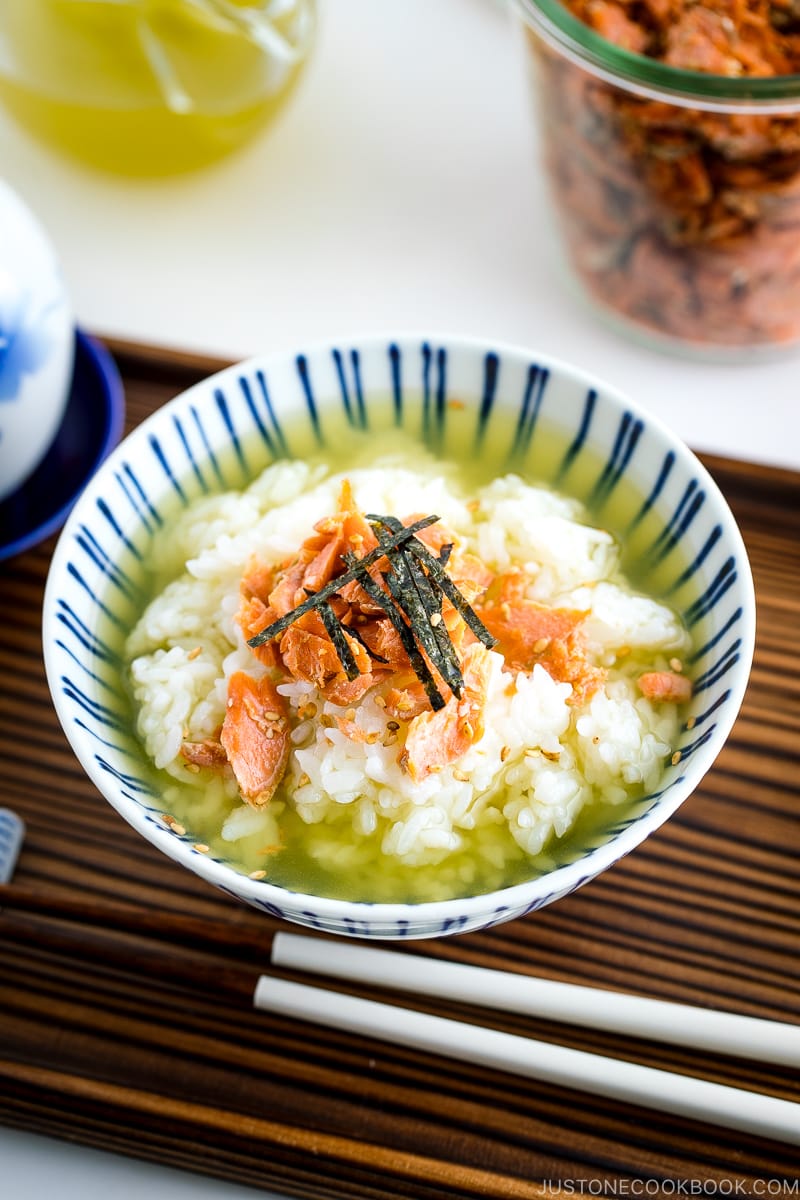
There are instant ochazuke packets you can buy from Japanese/Asian grocery stores or Amazon. They include dried pickled plum, salmon, nori, rice crackers, and green tea powder. All you need to do is pour hot water or tea over. It’s convenient, but you can’t beat the taste and flavor of homemade ochazuke.
I often make the recipe when I have leftover salted salmon. It is especially delicious with homemade dashi broth! I wouldn’t even mind eating this Japanese comfort food for breakfast, lunch, and dinner.
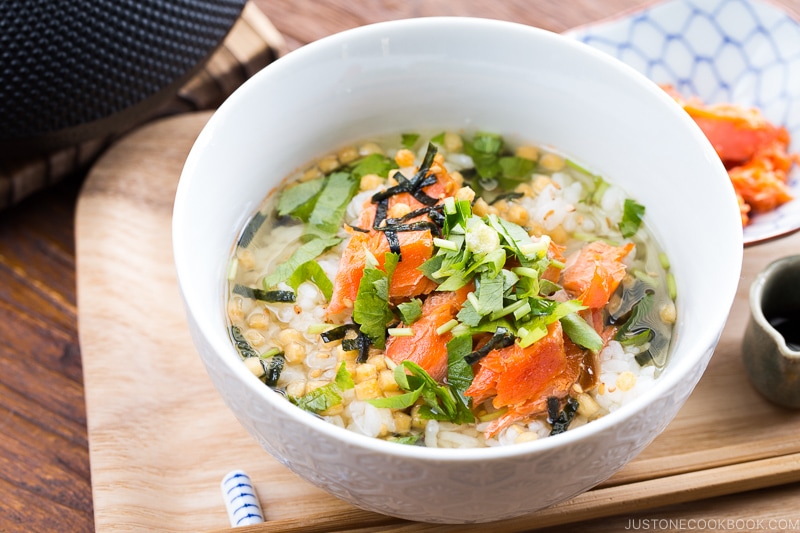
Wish to learn more about Japanese cooking? Sign up for our free newsletter to receive cooking tips & recipe updates! And stay in touch with me on Facebook, Pinterest, YouTube, and Instagram.
Ochazuke (Green Tea Over Rice)
Ingredients
- 1 fillet Homemade Japanese Salted Salmon (cooked; you can also substitute any leftover teriyaki, grilled, or pan-fried salmon for a slightly different flavor; see the note below for raw salmon; skip for vegetarian)
- 1 cup cooked Japanese short-grain rice
- 1 tsp bubu arare (crispy puffed rice pellets) (or crushed Japanese rice crackers)
- 1 tsp shredded nori seaweed (kizami nori)
- ¼ tsp toasted white sesame seeds
- 2 sprigs mitsuba (Japanese parsley) (or ⅛ scallion, cut into small pieces)
- wasabi (optional, to taste)
For Ochazuke with Dashi
- 1 cup dashi (Japanese soup stock) (use standard Awase Dashi, dashi packet or powder, or Vegan Dashi)
- 1 tsp mirin
- 1 tsp soy sauce
- ⅛ tsp Diamond Crystal kosher salt
For Ochazuke with Green Tea
- 2 tsp Japanese green tea leaves (I used genmaicha, but sencha, hojicha, and mugicha also work; use 3 g (1 tsp) tea leaves per 100 ml (about ½ cup) hot water)
- 1 cup hot water (see the tea leaves package for the appropriate water temperature to use)
- ½ tsp soy sauce (optional)
Instructions
Choose Your Ochazuke Type Below:
- Gather all the ingredients for Ochazuke with Dashi. You can prepare the dashi from scratch using my Awase Dashi recipe, a dashi packet, or a dashi powder. For a plant-based option, you can also make Vegan Dashi from scratch.

- Gather all the ingredients for Ochazuke with Green Tea. Feel free to use your favorite type of green tea.
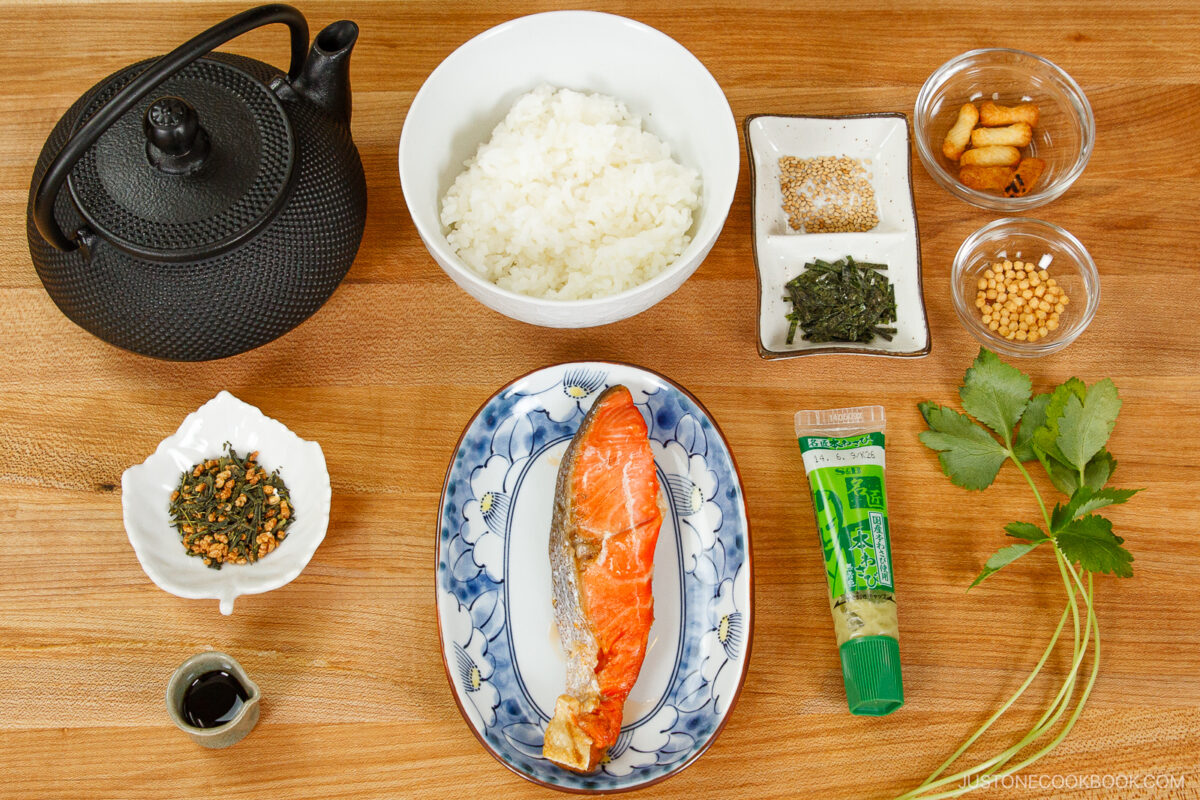
To Prepare the Ingredients
- (Skip this step if vegetarian) Remove the skin and bones from 1 fillet Homemade Japanese Salted Salmon, then flake the salmon into bite-size pieces and set aside. If you don’t have 1 tsp bubu arare (crispy puffed rice pellets), crush Japanese rice crackers into small pieces. You can use a plastic bag to make it easier.

To Prepare the Dashi or Tea
- Ochazuke with Dashi: Combine 1 cup dashi (Japanese soup stock), 1 tsp mirin, 1 tsp soy sauce, and ⅛ tsp Diamond Crystal kosher salt in a small saucepan. Bring it to a boil, then transfer to a small teapot to keep warm.
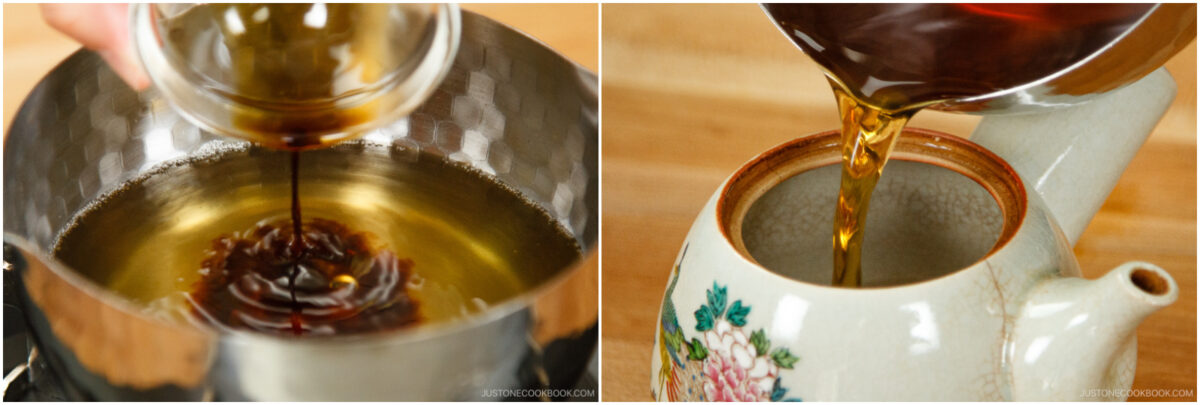
- Ochazuke with Tea: Put 2 tsp Japanese green tea leaves in a pot or teapot. Bring 1 cup hot water to the appropriate temperature for your tea and pour it over the leaves. Let it steep for 1–2 minutes, or follow the directions on your tea package.
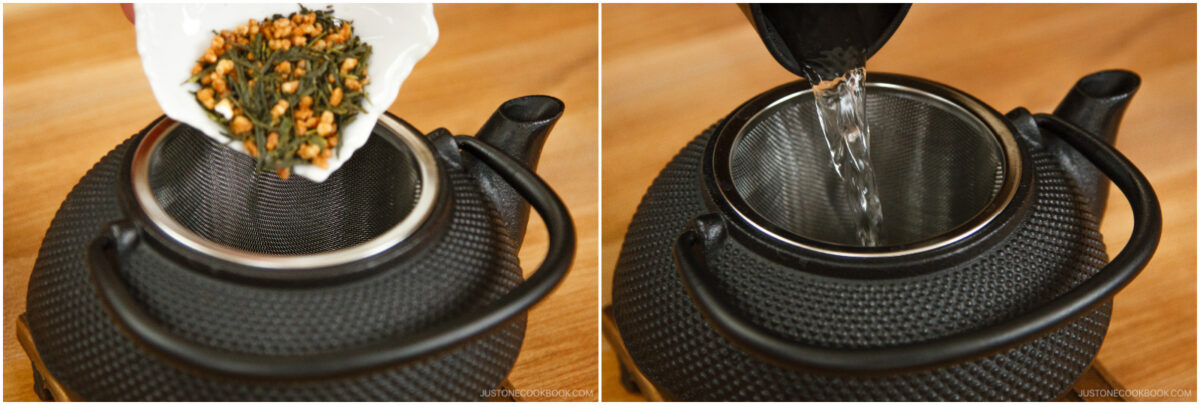
To Serve
- For each serving, place 1 cup cooked Japanese short-grain rice in an individual bowl. Top with the flaked salmon, then sprinkle 1 tsp bubu arare (or crushed rice crackers), 1 tsp shredded nori seaweed, and ¼ tsp toasted white sesame seeds over the rice. Serve tsukemono (pickles), such as Pickled Cucumber, on the side.
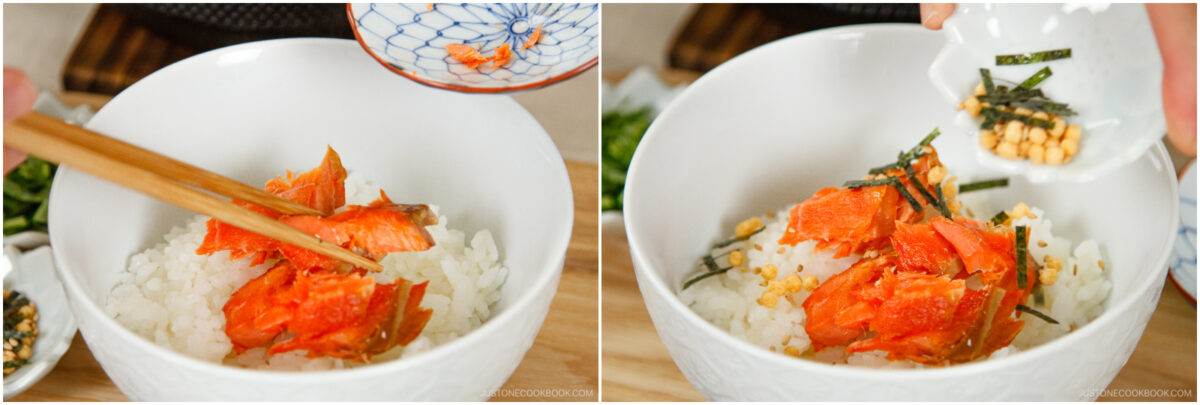
To Enjoy
- Ochazuke with Dashi: When you‘re ready to eat, pour the hot dashi over the rice until it's halfway submerged. Top with 2 sprigs mitsuba and wasabi. Enjoy!
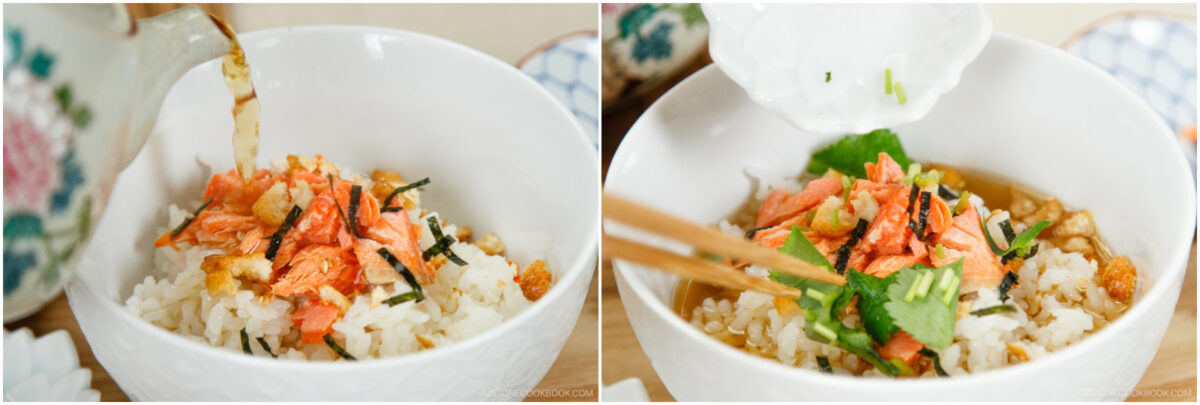
- Ochazuke with Tea: When you‘re ready to eat, pour the hot tea over the rice until it's halfway submerged. Top with 2 sprigs mitsuba and wasabi. Add ½ tsp soy sauce, if you‘d like. Enjoy!
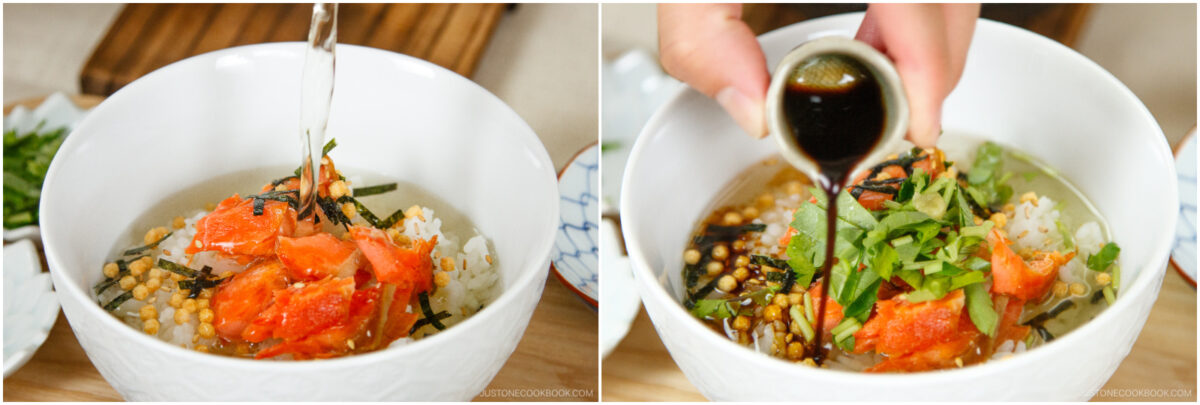
For Ochazuke in the Summertime
- You can use cold rice and cold dashi or tea (I love mugicha or barley tea) in the summertime to enjoy a cool and refreshing version of Ochazuke.
Notes
Nutrition
Did you make this recipe?
Tag @justonecookbook on Instagram so we can see your delicious creation!
Editor’s Note: The post was originally published on July 23, 2014. It’s been edited and republished in April 2020.


